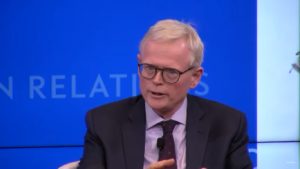
Former China correspondent and author Ian Johnson was forced to leave the country in 2020 and revisited China earlier in 2023 for Foreign Affairs. He found a country in stagnation, that was used to double-digit growth, but lost its economic glamor, the former power base of the Communist Party. Strict government regulations changed China he knew. Also, information on his latest book Sparks: China’s Underground Historians and their Battle for the Future.
Ian Johnson:
In the early months of 2023, some Chinese thinkers were expecting that Chinese President Xi Jinping would be forced to pause or even abandon significant parts of his decadelong march toward centralization. Over the previous year, they had watched the government lurch from crisis to crisis. First, the Chinese Communist Party had stubbornly stuck to its “zero COVID’’ strategy with vast lockdowns of some of China’s biggest cities, even as most other countries had long since ended ineffective hard controls in favor of cutting-edge vaccines. The government’s inflexibility eventually triggered a backlash: in November 2022, antigovernment protests broke out in Chengdu, Guangzhou, Shanghai, and Beijing, an astounding development in Xi’s China. Then, in early December, the government suddenly abandoned zero COVID without vaccinating more of the elderly or stockpiling medicine. Within a few weeks, the virus had run rampant through the population, and although the government has not provided reliable data, many independent experts have concluded that it caused more than one million deaths. Meanwhile, the country had lost much of the dynamic growth that for decades has sustained the party’s hold on power.
Given the multiplying pressures, many Chinese intellectuals assumed that Xi would be forced to loosen his iron grip over the economy and society. Even though he had recently won an unprecedented third term as party general secretary and president and seemed set to rule for life, public mistrust was higher than at any previous point in his decade in power. China’s dominant twentieth-century leaders, Mao Zedong and Deng Xiaoping, had adjusted their approach when they encountered setbacks; surely Xi and his closest advisers would, too. “I was thinking that they would have to change course,” the editor of one of China’s most influential business journals told me in Beijing in May. “Not just the COVID policy but a lot of things, like the policy against private enterprise and [the] harsh treatment of social groups.”
But none of that happened. Although the zero-COVID measures are gone, Beijing has clung to a strategy of accelerating government intervention in Chinese life. Dozens of the young people who protested last fall have been detained and given lengthy prison sentences. Speech is more restricted than ever. Community activities and social groups are strictly regulated and monitored by the authorities. And for foreigners, the arbitrary detention of businesspeople and raids on foreign consulting firms have—for the first time in decades—added a sense of risk to doing business in the country.
You can order his full article for free here.
Ian Johnson is a speaker at the China Speakers Bureau. Do you need him at your meeting or conference? Do get in touch or fill in our speakers’ request form.
Are you looking for information on Ian Johnson’s latest book?
Are you looking for more political experts at the China Speakers Bureau? Do check out this list.
